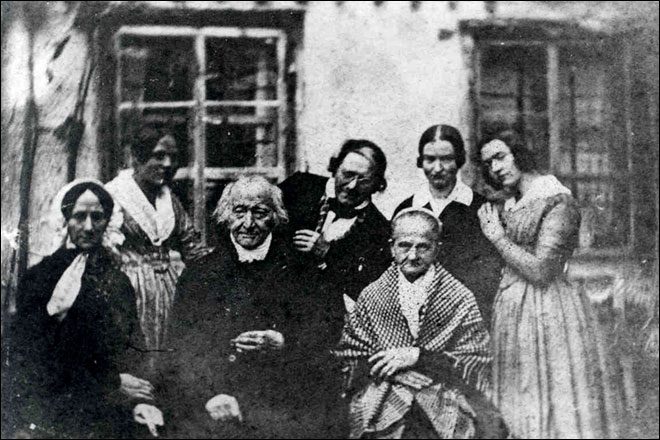July 07, 2006
Gratuitous Musickal Posting (TM)

How seriously cool is this. Know who that woman is at front left? Would you believe none other than Constanze Weber, widow of Wolfgang Amadeus Mozart?
The extremely early daguerreo was typed (I guess) in 1840 when Constanze was 78, long after Mozart's death in 1791. She had remarried after Mozart died and, if memory serves, wound up having a fairly comfortable and (obviously) long life.
Pretty durn amazing, if you ask me.
Looking at this photo makes me wonder (again) how the history of European music would have developed had Mozart lived another 30, 40 or 50 years.
Yips! to A.C. Douglas.
UPDATE: Whoops! Looks like the whole thing was a fraud. ACD's link has been updated to give the relevant information. Well, too bad.
Posted by Robert at July 7, 2006 03:38 PM | TrackBackThe loss of Mozart at such a young age is without doubt the worst calamity western art music ever suffered. The finale of the Jupiter symphony, with it's five-voice fully invertible set of contrapuntal themes, was just a hint of what was to come.
Problem is, had he lived another twenty years, we may never have heard of Beethoven. Seriously. On the other hand, we may never have heard of Wagner either, which would be an enormous plus in my book.
I guess we'll just have to figure God knew what he was doing. Mozart doubtless would have composed some impossibly sublime and transcendentally perfect music had he lived longer, but he would never have had the swingin' massive "pair" that Beethoven carried around with him. ;^)
Tough choice, for sure.
Posted by: Hucbald at July 7, 2006 04:35 PMThere is much in what you say. Certainly in the Jupiter and even in the 40th, we begin to get some clues as to the direction(s) Mozart's musical thoughts were beginning to turn. One thing is certain - among Mozart, Haydn and Beethoven, the classical style pretty much ran its course. Whatever happened during the first quarter of the 19th Century, it was not going to be an attempted continuation of the style of the last quarter of the 18th.
Frankly, though, I think you underestimate Beethoven. Whatever had happened, I think his obvious musical genius would have adapted to it. Ludvig van would have weathered the storm.
On the other hand, Beethoven really was not the motivating force of musical thought in the early 19th Century. Rather, he represented an end of a branch, as it were, the one started by Haydn. Even in his own lifetime, it was recognized that the primary flow of European music was instead taking its cue through a line marked by composers like Hummel and Chopin. In his old age, even Beethoven himself noted this. It was also noted that there was something of a vacuum of creative genius left after Beethoven's passing. Who was it who first called Brahms' First Symphony "Beethoven's Tenth"?
I think that Mozart's continued presence would instead have inundated composers of the calibre of, say, the aforementioned Hummel, Schubert or even Schumann. And God knows what Brahms would have made of a senior Mozart.
All complete speculation, obviously. But fascinating nonetheless.
Posted by: Robbo the LB at July 7, 2006 09:25 PMyes it is a daguerreotype, and the funny thing is the age, since "photography" as we know it was only truly invented or discovered in 1839. :0)
just a bit of knowledge from your friendly photographing gaelic north carolinian, GG


 Image courtesy of the lovely and talented
Image courtesy of the lovely and talented 